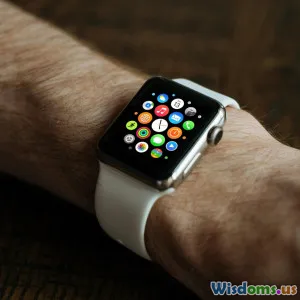
Best App Features for ADHD Focus and Mental Wellness
9 min read Discover essential app features that empower ADHD focus and mental wellness with science-backed strategies and real-life tools for improved daily life. (0 Reviews)
Best App Features for ADHD Focus and Mental Wellness
Living with Attention Deficit Hyperactivity Disorder (ADHD) can often feel like a constant battle against distraction, impulsivity, and emotional challenges. Fortunately, the rise of digital health tools brings new hope: apps designed with ADHD in mind. But what exactly makes an app effective in improving focus and mental wellness for those with ADHD? This comprehensive exploration drills down into the best app features grounded in psychological research and real user experiences.
Understanding ADHD and the Need for Specialized App Features
ADHD is characterized by difficulties with attention regulation, impulse control, and hyperactivity. These traits affect everything from managing daily tasks to maintaining emotional balance. However, individuals with ADHD often respond better to technology that is structured yet flexible, visually engaging, and capable of breaking down complex tasks.
Why Customized Tools Matter
A 2021 study from the Journal of Attention Disorders highlights that personalization in digital interventions is crucial. Generic reminders or tasks often fail to engage users with ADHD because they don’t address the fragmented nature of their attention. Apps must offer adjustable reminders, adaptable UI designs, and customizable task structures.
Core App Features that Enhance ADHD Focus
Your app toolkit should integrate multiple evidence-based features to effectively counter inattention and impulsivity. Here are the leading features that stand out:
1. Adjustable and Contextual Reminders
Simple alarms rarely cut it. Advanced ADHD apps employ smart reminders that:
- Send notifications based on location or time of day (context-aware alarms).
- Allow users to set varied reminder tones or vibration patterns to reduce habituation.
- Include 'nagging' or repeated prompts that escalate only when a task remains incomplete.
For example, the app Due is beloved for its recurring reminders until tasks are marked done, which is critical for users prone to forgetfulness.
2. Task Breakdown and Visual Organization
Breaking tasks into bite-sized chunks helps avoid overwhelm. Effective ADHD apps feature:
- Hierarchical task lists with subtasks.
- Visual kanban boards or mind maps allowing spatial arrangement.
- Color-coding and iconography to prioritize and categorize.
Trello and Asana offer these with flexibility, but ADHD-specific apps like Brain Focus enhance it with timers and focus-boosting cycles baked in.
3. Gamification Elements
Gamification turns routine management into engaging challenges, enhancing dopamine pathways often underactive in ADHD brains. Key elements include:
- Point rewards for task completion.
- Streaks or milestone badges.
- Friendly competition with oneself or peers.
Forest app exemplifies this by planting virtual trees as users focus, creating a visual growing forest representing productivity.
4. Focus-Enhancement Tools
Built-in tools such as:
- Pomodoro timers adhering to scientifically recommended 25-minute focus intervals.
- White noise or ambient soundscapes tailored for concentration.
- Minimalist modes that temporarily block distracting notifications or apps.
The app Focus@Will demonstrates the effectiveness of curated soundtracks in growing attention span, supported by neuroscience research.
5. Mood and Mental Wellness Support
Managing mental well-being is key to sustaining focus. Important features include:
- Daily mood tracking with options for notes on triggers.
- Mindfulness and breathing exercises guided via audio or visuals.
- Cognitive Behavioral Therapy (CBT)-based exercises or journaling prompts.
Apps like MoodMission integrate CBT strategies, proving helpful for users experiencing mood dysregulation common in ADHD.
6. Data-Driven Progress Analytics
Insightful dashboards displaying trends over time empower self-awareness:
- Visualization of focus duration, missed tasks, and mood fluctuations.
- AI-generated recommendations based on usage patterns.
- Customizable reports that can be shared with therapists or coaches.
This transparency turns abstract impulses and distractions into actionable data, motivating sustained improvements.
7. Integration with Other Platforms
ADHD apps that synchronize with calendars, email, and smart home devices facilitate seamless organization:
- Syncing tasks across phone, tablet, and desktop.
- Importing events and deadlines automatically.
- Voice command compatibility, accommodating users who prefer hands-free interactions.
Google Calendar integration, for instance, ensures reminders are embedded in daily schedules without double entry.
Real-World Examples of Leading Apps and Features
To ground these features, let’s examine popular apps reshaping ADHD management:
Todoist
Widely recognized for its simplicity and power, Todoist allows task prioritization, color coding, and project subtask creation. Its smart scheduling feature reschedules unfinished tasks automatically—a boon for ADHD mindsets.
Focus@Will
Rooted in neuroscience, this app offers curated music tracks designed to improve focus by altering brainwave patterns. A 2017 study by the company reported 16% increased focus in ADHD users.
MindNode
This mind-mapping tool serves well for visual thinkers with ADHD. Brainstorming and organizing ideas visually alleviate executive function challenges.
Bearable
Combining mood tracking with habit logging, Bearable caters to mental wellness by identifying correlations between habits and symptoms—a crucial insight for ADHD individuals managing co-occurring conditions.
Forest
Forest's unique approach gamifies concentration by growing a virtual tree for every session of uninterrupted focus. The visual progress and the act of nurturing something tangible provide tangible motivation.
Tips for Selecting the Best Apps
- Trial Periods: Leverage free trials to assess if the app’s rhythm suits your unique workflow.
- Simplicity Over Feature Overload: A cluttered interface can increase overwhelm; find the balance.
- Community and Support: Apps with active user communities or coaching support may provide added accountability.
- Privacy and Data Security: Given the sensitivity of mental health data, verify robust privacy policies.
Conclusion
Digital apps hold transformative power for individuals managing ADHD—they are not mere convenience but vital companions that structure a scattered mind. By focusing on features such as customizable reminders, task breakdown tools, gamification, focus aids, and integrated mood supports, these apps address both cognitive and emotional challenges seamlessly.
Harnessing the right set of features—and ensuring consistency and personalization—can vastly improve attention, reduce procrastination, and elevate mental wellness. As technology progresses, the future of ADHD management looks increasingly promising, tailor-made not just to accommodate, but to empower.
Empower your focus, nurture your wellness, and transform daily challenges into victories—starting with the right app features today!
References
- Journal of Attention Disorders (2021). Personalized digital interventions in ADHD.
- Focus@Will Research Reports. https://www.focusatwill.com/research/
- Barkley, R. A. (2015). Attention-Deficit Hyperactivity Disorder: A Handbook for Diagnosis and Treatment.
- Todoist. Features & Benefits. https://todoist.com/features
- Forest App: Science behind the app. https://www.forestapp.cc/
Note: This article is educational and does not replace professional diagnosis or treatment.
Rate the Post
User Reviews
Popular Posts
















